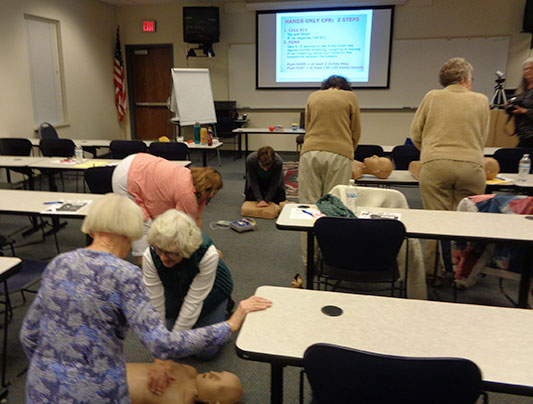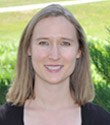Jun 13, 2018
Oregon Washington Health Network and Yellowhawk Tribal Health Center “Tackle Everything” to Improve the Health of Local Community Members
by Allee Mead
 Astin Mills, a
staff nurse and heart disease educator, held a hands-only
CPR training for the students of Ione, Oregon (population
of just over 300). That evening, she offered a community
session at Ione Community Church. One school employee
posted on Facebook about the community session, and seven
people showed up to the evening event.
Astin Mills, a
staff nurse and heart disease educator, held a hands-only
CPR training for the students of Ione, Oregon (population
of just over 300). That evening, she offered a community
session at Ione Community Church. One school employee
posted on Facebook about the community session, and seven
people showed up to the evening event.
Although a seemingly small number, this group of dedicated community members began generating ideas of how they could expand this training for the broader good of the local community. Since EMS response can take up to 30 minutes to reach a person in cardiac arrest, community members talked about placing an AED in the church, which is open to the public 24/7. Discussions and planning aimed at bringing an AED into the community are ongoing.
This story demonstrates the power of community education and the importance of community-driven solutions to healthcare challenges. Yellowhawk Tribal Health Center, the founding organization and current member of the Oregon Washington Health Network (OWhN), is utilizing community education and other initiatives to improve the health of its service area.
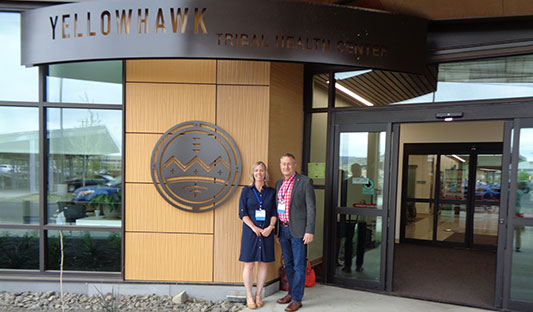
Yellowhawk is owned and governed by the Confederated Tribes of the Umatilla Indian Reservation (CTUIR) and serves eligible patients in the rural Oregon counties of Morrow, Umatilla, and Union and the rural Washington county of Walla Walla.
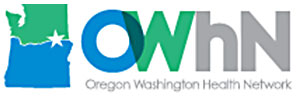 "Behavioral health, chronic disease, and
recruitment are our biggest needs," said Dan Peterson,
manager of OWhN. He added that Umatilla County currently
has no psychiatrists, while Union County has one,
providing limited access to services greatly needed by
the community. In terms of chronic disease, heart disease
was Oregon's
second-leading cause of death in 2016.
"Behavioral health, chronic disease, and
recruitment are our biggest needs," said Dan Peterson,
manager of OWhN. He added that Umatilla County currently
has no psychiatrists, while Union County has one,
providing limited access to services greatly needed by
the community. In terms of chronic disease, heart disease
was Oregon's
second-leading cause of death in 2016.
Yellowhawk was able to take these challenges and turn them into opportunities. Oftentimes in rural and tribal communities, where resources are scarce, community members and healthcare providers create innovative solutions to address healthcare challenges. Jayne Berube, who works in the Health Resources and Services Administration (HRSA) Federal Office of Rural Health Policy (FORHP) as the Rural Health Network Development Program Coordinator, explained that rural tribal populations have unique strengths to overcome healthcare challenges: "Community members and families are often closely knit and support one another as resources to improve the health status of the community and to advocate for needed services."
Community members and families are often closely knit and support one another as resources to improve the health status of the community and to advocate for needed services.
To improve its service area's health status, said FORHP project officer Allison Hutchings, Yellowhawk and OWhN are working with community partners to "tackle everything from heart disease to depression screening to workforce recruitment and retention," some of the most pressing healthcare challenges in the service area.
Depression screenings and behavioral health
After the service area experienced five suicides in a 90-day period, Yellowhawk staff members asked Peterson if he would help them write a grant application for suicide awareness. He was then contracted as a grant writer for two years at Yellowhawk and applied for the 2015-2018 HRSA FORHP Rural Health Care Services Outreach Program grant.
With this grant, Yellowhawk and OWhN developed a depression screening initiative. Local providers were already using the PHQ-9 screening tool, but not everyone had a referral or reporting process in place, so Yellowhawk helped providers develop consistent processes for referral and data reporting to the mental health agency Lifeways. Now, the average number of depression screenings exceeds 1,000 per year in the four counties.
As the lead agency on the Outreach grant, Yellowhawk was able to bring together the CTUIR, local hospitals, county health departments, and other agencies to collectively address the behavioral health needs of the community.
"We were able to really adjoin the needs of the community with the needs of the tribe," said Peterson. "I think it really helped the community better understand the tribe…and vice versa."
In addition, OWhN is developing an action plan for behavioral health services that looks at homelessness in the region. In April, Yellowhawk held a class for network members and providers to discuss goals and services that will address homelessness. "We're starting to realize just how few services we have for the homeless and how much work we have to do there," said Peterson. Over 40 people representing more than 20 organizations attended the class. OWhN and Yellowhawk have also held trainings for much needed topics like value-based care and evidence-based care.
I think, for the first time, folks realized that the folks with behavioral health needs in our service area were really not what they were perceived to be. They really were people who were trying to turn their lives around and really were running into a lot of barriers.
The network also hosted the Patients' Behavioral Health Forum, which encouraged patients receiving behavioral health services to share their experiences and ask their service providers questions. The forum allowed behavioral health patients to be heard and community members to learn what mental health and substance use disorder actually look like. "I think, for the first time, folks realized that the folks with behavioral health needs in our service area were really not what they were perceived to be," said Peterson. "They really were people who were trying to turn their lives around and really were running into a lot of barriers."
Peer counselors
In addition, Yellowhawk works with patients struggling with substance use disorder through peer counselors. These counselors (laypeople who are recovering from substance use disorders) help patients with transportation and child care and provide encouragement through the difficult process of recovery. "These people just want an opportunity to give back," said Peterson, "or an opportunity to work and help other people."
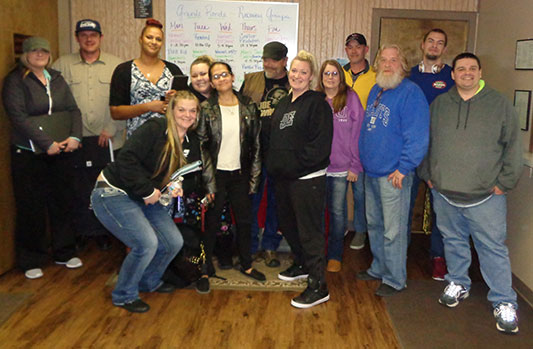
Peer counselors asked Yellowhawk staff about getting certified as entry-level peer mentors. Yellowhawk partnered with the nonprofit organization Daystar to provide two training classes. Yellowhawk has trained 38 peer counselors (6 CTUIR members) so far, and many of them already have found work with health providers or social services in the service area.
Recruitment and retention
In addition, the grant helped OWhN bring potential providers to the service area. OWhN partnered with Oregon Health & Science University, the Legacy Health Internal Medicine residency program, the University of Portland Doctor of Nursing Practice program, and the Western University of Health Sciences Doctor of Osteopathic Medicine program to place medical students and residents in eastern Oregon. OWhN hopes that these students will continue to live and work in the community after they've completed their education, thus helping to alleviate the lack of healthcare providers in the area.
Before, it was rare for neighboring schools to place medical students and residents in this part of the state. However, in the first two years of the HRSA grant, OWhN placed nine residents and medical students within the OWhN network and was able to recruit three providers to start work in the region by 2019. OWhN hopes to establish its own rural training track program in Pendleton, Oregon.
In addition, OWhN launched a regional telehealth program, funded by Cambia Health Foundation, with Yellowhawk and three other hospitals. The program will allow the facilities to collaborate, jointly bill services, and increase access to over 50 specialized medical services, including tele-psych services in the emergency departments.
John Butts from the Georgia Health Policy Center provides technical assistance support to FORHP grantees and has worked with Yellowhawk since 2015. He said of Yellowhawk, "They really have brought in attention to rural workforce issues and have put significant effort into developing the partnerships needed to strengthen rural recruitment and retention efforts."
Heart disease and cancer prevention
OWhN began to provide classes about heart-healthy living and hands-only CPR training to the students and other community members of Heppner, Ione, Milton-Freewater, and Pendleton in Oregon. So far, OWhN has provided heart-healthy education and CPR training to about 100 community members and CPR training to over 400 students in seven schools.
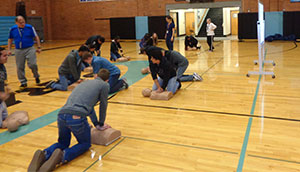
Mills, the heart disease educator, has been educating students and community members in the Portland area and will bring her skills to the Yellowhawk service area this summer. Mills believes that her ICU nursing experience is an asset to community education: "Because I work at the bedside and then I tell stories from the bedside, I've been more effective at getting people to understand the why of making lifestyle changes."
When Mills first began as a nurse 14 years ago, her heart disease patients in the ICU looked old enough to be her grandparents. More recently, however, her heart disease patients look closer to Mills's age: mid-30s. "It's the same story, but it's happening 30, 40 years younger," said Mills, "and it's no longer an anomaly for that to happen."
You guide them toward what is a reasonable place to start because it comes from a basic understanding that lifestyle changes have to come from within that person.
Mills's work for OWhN will involve screening a patient for risk factors, using motivational interviewing to determine the patient's goals, and connecting them with local resources to meet those goals. "You guide them toward what is a reasonable place to start," said Mills, "because it comes from a basic understanding that lifestyle changes have to come from within that person."
This summer, OWhN will hold a heart disease and cancer clinic. During this clinic, community members can stop by the hospital and ask questions about these two diseases. OWhN employees will provide screenings and follow-up treatment plans for those who are at risk for heart disease and/or cancer.
Secrets to Success
To achieve success and to create sustainable programs, Peterson recommended that facilities have a wide range of partners like county health departments and other healthcare facilities in the region. Regular meetings are also important for identifying and resolving problem areas.
Peterson also recommended that healthcare facilities partner when recruiting providers: "If one hospital knows of a specialist interested in coming to eastern Oregon, they'll share information with our other hospital partners and help us to get that person recruited." Then, if one facility cannot employ a specialist full-time, the specialist can travel to partnering facilities and still work full-time.
Mills connected with a paramedic from Hermiston, Oregon, who leads health awareness events at the senior center lunch every week. The paramedic advised Mills on effective marketing strategies. He told her that senior centers are a great place to raise awareness of community events: "Forget advertising. Forget sending out flyers. Just go to one senior center and have lunch with people and talk for a minute. They all talk to one another, and pretty soon every senior from every town will be showing up to your events."
These key factors – collaboration, communication, and varied programming – are helping to improve the health of the region's population now and for future generations.
